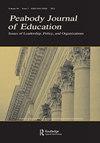机构代理人与学生活动家的关系
Q2 Social Sciences
引用次数: 1
摘要
摘要研究大学生激进主义的研究人员已经对这些学生的动机、策略和教育成果有了很多了解。关于活动家和主要机构代理人之间的关系,人们知之甚少。对于具有少数族裔身份的学生活动家来说,机构代理人有时会在其机构所支持和实施的公平正义价值观之间建立和维护障碍。在这篇文章中,我们使用了一项针对少数族裔学生活动家的全国性叙事调查研究的数据,来了解活动家和代理人是如何在相互支持和对抗的关系中工作的。具体而言,我们关注参与者的观点,以命名机构代理人如何为学生的行动主义制造障碍并提供支持。我们分享了对那些寻求与以支持和公平承诺为基础的学生活动家建立更牢固关系的人的实践启示。这篇文章为那些试图了解学生激进主义更重要的制度动态的研究人员提供了一扇窗户,让他们了解一些推动和阻止大学校园变革的关键人际关系。本文章由计算机程序翻译,如有差异,请以英文原文为准。
Relationships Between Institutional Agents and Student Activists
ABSTRACT Researchers studying college student activism have learned much about those students’ motivations, tactics, and educational outcomes. Less is known about the relationships between activists and key institutional agents. For student activists with minoritized identities, institutional agents sometimes establish and maintain barriers between their institutions’ espoused and enacted values of equity and justice. In this article, we used data from a national narrative inquiry study of minoritized student activists to understand how activists and agents worked in supportive and adversarial relationships with each other. Specifically, we focus on participants’ perspectives to name the ways institutional agents created barriers against and provided support for students’ activism. We share implications for practice for those seeking to forge stronger relationships with student activists grounded in support and a commitment to equity. This article offers researchers who seek to understand the more significant institutional dynamics of student activism a window into some of the critical interpersonal relationships that drive and foreclose change on college campuses.
求助全文
通过发布文献求助,成功后即可免费获取论文全文。
去求助
来源期刊

Peabody Journal of Education
Social Sciences-Education
CiteScore
2.20
自引率
0.00%
发文量
43
期刊介绍:
Peabody Journal of Education (PJE) publishes quarterly symposia in the broad area of education, including but not limited to topics related to formal institutions serving students in early childhood, pre-school, primary, elementary, intermediate, secondary, post-secondary, and tertiary education. The scope of the journal includes special kinds of educational institutions, such as those providing vocational training or the schooling for students with disabilities. PJE also welcomes manuscript submissions that concentrate on informal education dynamics, those outside the immediate framework of institutions, and education matters that are important to nations outside the United States.
 求助内容:
求助内容: 应助结果提醒方式:
应助结果提醒方式:


